People
The TrEnD laboratory has a number of academic staff, technical staff, PhD & honours students that work across our three main research disciplines: eDNA, aDNA and genomics. If you are interested in joining our team as a student or postdoc feel free to drop us a line.
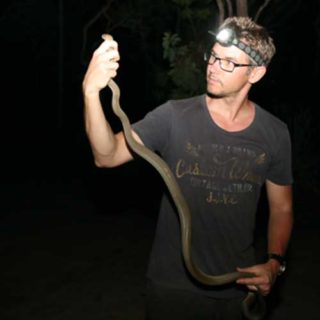
Professor Morten E. Allentoft
Head of the TrEnD Laboratory
Morten is an evolutionary biologist and was recruited in mid-2020 to lead the TrEnD Lab. He obtained a PhD from Canterbury University, New Zealand in 2011 and then established himself as a group leader at Centre for GeoGenetics (University of Copenhagen, Denmark). He has a background in ancient DNA (aDNA) research, working primarily on population genetics of extinct megafauna and ancient humans, and aDNA method development. Although Morten is still engaged in ancient DNA projects, most of his current research revolves around molecular evolution, population genetics and conservation genetics – with a particular passion for reptiles and amphibians. His vision for the TrEnD Lab is to practice a holistic form of molecular ecology by merging eDNA, aDNA and genomic disciplines. While based at Curtin University, Allentoft maintains a fractional affiliation with University of Copenhagen, ensuring a strong collaborative connection across the two continents.
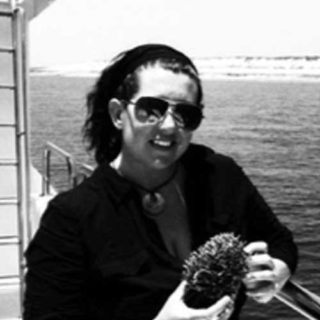
Associate Professor Zoe Richards
Senior Research Fellow
Zoe is a coral biologist (molecular ecology and taxonomic expertise) and a Senior Research Fellow. Zoe completed her PhD at James Cook University on the implications of rarity for Acropora conservation and now leads the CORE research group which specialises in the area of coral biodiversity and how best to monitor and protect it. Active areas of current research include examining the ecology and resilience of coral communities in Western Australia, examining the response of coral biodiversity to disturbance and resolving taxonomic problems with total evidence approaches. Zoe is also involved in numerous phylogenomic, population genetic and eDNA projects that aim to explore species divergence, ecological connectivity and benthic biodiversity.
Current Students in the Coral Research Group:
Katrina West (Postdoc); Arne Adam (PhD); Jason Alexander (PhD); David Juszkiewicz (PhD); Georgia Nester (PhD); Sophie Preston (Masters); Rodrigo Garcia (Remote Sensing Specialist and Adjunct Research Scientist).
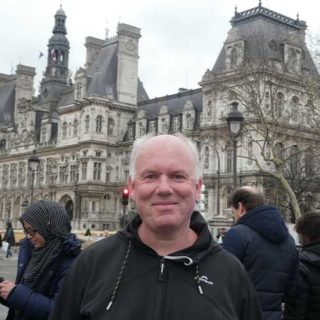
Associate Professor Paul Nevill
> Genetics Lead – Australian Research Council Centre for Mine Site Restoration (CMSR)
> View Google Scholar profile
Paul’s research focuses on the use of the latest molecular approaches for the conservation and the recovery of ecosystems. Paul is interested in the use of molecular ecology to understand the genetic factors that impact threatened species and in the use of genetics to improve restoration monitoring. Since 2010 Paul has completed a post-doc in conservation genetics at Kings Park Botanic Garden prior to joining Curtin University in 2015. During and post-PhD studies, Paul has established collaborations with government agencies, private industries and other academic institutions. Paul mentors and supervises HDR students and is also involved in undergraduate teaching at Curtin University.
Current Students:
Sheree Walters (PhD), Mieke van der Heyde (PhD), Kristen Fernandes (PhD), Kaylene Craig (PhD), Joshua Kestel (PhD)
Postdoctoral researchers
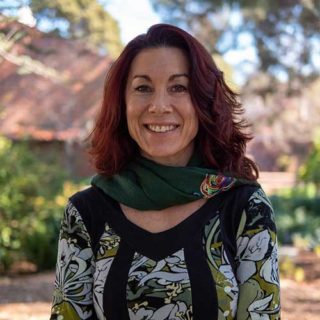
Dr. Nicole White
Research Fellow
Nicole is a Research Scientist and the Lab Manager for the Trace and Environmental DNA Laboratory. Nicole’s research focuses on the use of cutting-edge and traditional molecular approaches for the conservation and protection of Australia’s unique fauna. In 2012, Nicole obtained her PhD in Biological Sciences and her research program focused on the development and application of genetic tools for the conservation, management and protection of Western Australia’s endangered white-tailed black-cockatoo species. Since 2012, Nicole completed a post-doc in ancient DNA, conservation genetics and wildlife forensics at Murdoch University prior to joining Curtin University in 2014. Nicole’s current research involves the development of eDNA tools for subterranean fauna detection from environmental substrates such as groundwater and sediment.
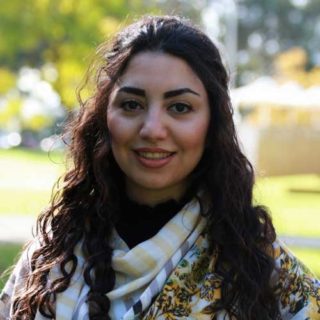
Mahsa Mousavi Mousaviderazmahalleh
Mahsa completed her PhD at The University of Western Australia on narrow-leafed lupin domestication and biodiversity, which also involved developing genomic resources for seven of its fungal pathogens using bioinformatic approaches. Inspired by the transferability of bioinformatics, she joined TrEnD in 2018 as a post-doctoral researcher working on an NHMRC funded project to determine the causative agents of tick-borne disease in Australia using metabarcoding techniques. Her current research focus is on developing genomic resources for the Pilbara Olive Python which is part of the eDGES program. In addition, she develops pipelines and scripts for data analysis, and provide bioinformatic support to students and staff. She is also affiliated with eDNA frontiers, which provides environmental DNA services to a variety of industries, such as oil/gas and fisheries.
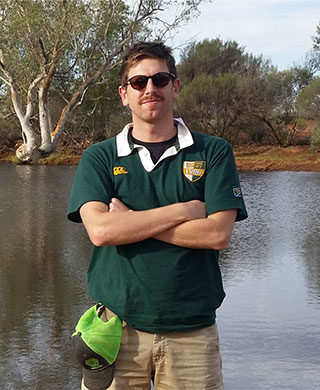
Mattia Sacco
Mattia is a TrEnD post-doctoral researcher interested in freshwater environments and the incorporation of multidisciplinary designs into the study of functional ecology. He completed his PhD at Curtin University on the ecological dynamics sustaining the subterranean biota of a West Australian groundwater ecosystem, a study that involved state-of-the-art isotopic and molecular techniques. His current project, funded by the eDGES program, focuses on the use of isotope analysis (SIA and CSIA) and eDNA technology to monitor biodiversity and characterize the ecosystem functioning of hypersaline lakes within the Chilean precordillera. Given the interdisciplinarity of his work and international experience, Mattia has an extended network of collaborators in Europe, America and Australia.
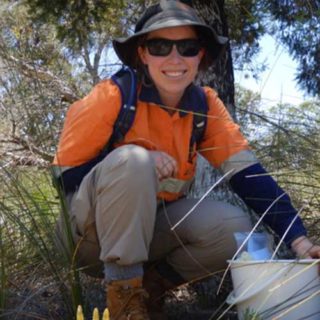
Mieke is currently a Research Associate with the Trace and Environmental DNA (TrEnD) Laboratory. Her research focus is developing and applying eDNA methods to monitor terrestrial and subterrestrial ecosystems. Mieke completed her PhD in 2020 with the ARC Centre for Mine Site Restoration (CMSR) and the TrEnD Labs. Her research focussed on the application of eDNA surveys to monitor soil microbes, vertebrates, invertebrates, and plants during mine site restoration. In late 2020, Mieke started her post-doc position at Curtin studying underground communities living in the groundwater (stygofauna).
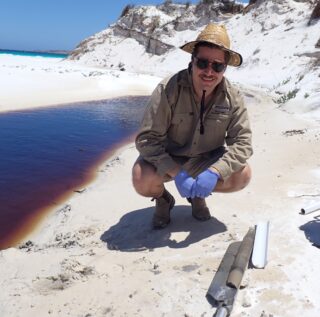
Dr Matthew Campbell
Research Fellow
Matt is a post-doctoral researcher investigating the potential of ancient sedimentary DNA as a tool for reconstructing Southwest Australia’s (SWA) paleoecology and paleoclimate during the late Quaternary period. In 2021, he earned his Ph.D. in Chemistry from Curtin University, studying modern microbial mat communities using metatranscriptomics and organic geochemical techniques. Post-Ph.D., Matt joined the TrEnD Lab as a research technician facilitating laboratory operations and working on a variety of eDNA projects. In 2023, he become a post-doctoral researcher under the supervision of Prof Morten E. Allentoft. He is currently working on extracting DNA from sediment cores sourced from lakes and wetlands in the SWA region and applying high-throughput sequencing techniques to identify past plant and animal communities. Matt is a strong advocate for the use of interdisciplinary approaches to address complex environmental challenges and believes that ancient DNA has great potential for informing conservation and management strategies in the face of global environmental change.
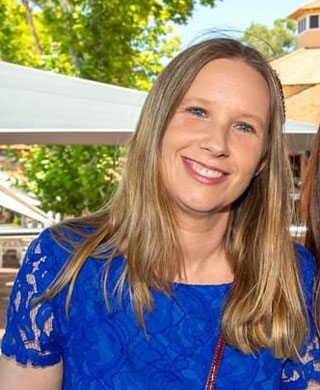
Sherralee Lukehurst
Research Officer
Sherralee is an experienced Molecular Biologist, who has previously worked at the Department of Primary Industries and Regional Development in the areas of fish health and aquatic biosecurity. In her current position, funded by the eDGES program, Sherralee is working on enhancing and validating the use of eDNA metabarcoding techniques for the purpose of detecting high priority Invasive Marine Species (IMS) for biosecurity applications.
Technical staff
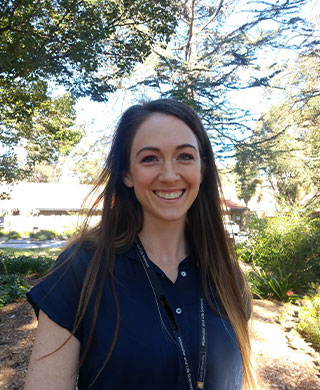
Jacquelyn Jones, PhD
Laboratory Manager, TrEnD Lab
The link between the gut microbiome and human health continues to be of great interest, with a number of inflammatory, and autoimmune diseases as well as neurological disorders, linked to shifts in microbial community structure. Colonization of the infant gut by commensal microorganisms may be the most important processes for maintaining the long-term stability of the microbiome. Therefore, intervention strategies that promote a healthy infant microbiome may be beneficial in preventing the onset of inflammatory disorders which develop in infancy and early childhood. Through an assessment of faecal microorganisms and metabolites in pregnant mothers, infants, and young children, this project aims to reveal subtle changes in microbial composition and metabolic response which correlate with the progression of Autism Spectrum Disorder, or allergic diseases. This investigation will use next generation sequencing technology as well as gas chromatography, both of which have been invaluable tools for microbiome research. A final aim of this project is to evaluate and recommend fecal sampling techniques that can be adopted by researchers also intending to assess the gut microbiome using data generated with these same techniques.
Students
PhD students
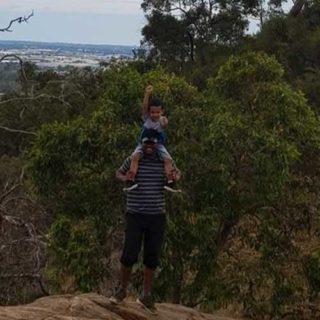
Alishum Ali
Alishum Ali is a multidisciplinary scientist who completed his undergraduate and honours studies at Murdoch University. His qualifications revolve around human biology & chemistry such as molecular biology and biochemistry. In 2017, he enrolled in a PhD program at Curtin University’s TrEnD lab with Professor Mike Bunce and Dr Claus Christophersen supported by a PhD scholarship from WAHMCC. His decision to do a PhD was intricately personal, due to his son “Yusif” being born preterm and now his PhD project concentrates on preventing preterm birth. Technically, he will be working with samples and data collected in a local hospital by the Western Australian Pregnancy Biobank (WAPB). He will generate and integrate patient multi-Omics data using machine learning models to discover predictive biomarkers.
In the TrEnD lab, Ali will be using DNA metabarcoding, shot-gun sequencing and bioinformatics for in-depth characterization of the pregnancy microbiome. His study design will assess biomarkers before and after current intervention. He envisages that the research will eventually help obstetricians deliver better health care to vulnerable women.
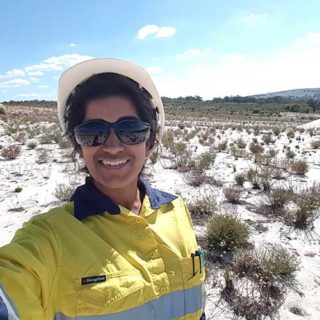
Kristen is a PhD candidate undertaking a co-enrolled PhD with Curtin University and the University of Copenhagen. She is under the supervision of Prof Michael Bunce, Dr Paul Nevill, Prof Tom Gilbert, and Dr Kristine Bohmann. Kristen completed her undergraduate studies and honours at Curtin University in 2017 examining the recovery of insect communities at restored mine sites through invertebrate DNA (iDNA) metabarcoding. Her PhD research further explores this area of research and focuses on looking at the recovery of insect communities and the communities of organisms (both macro and micro) that they vector after changes in land uses using iDNA metabarcoding techniques.
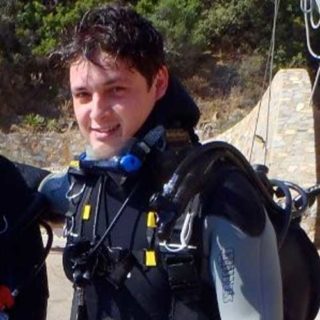
Arne is a PhD candidate started in June 2018 under the supervision of Dr. Zoe Richards, Adjunct Professor Mike Bunce and Dr. Luke Thomas (AIMS). Arne completed his undergraduate studies in 2012 at the University of Ghent (Belgium), examining the foraging behaviour of Atlantic cod at windmill farms at the North Sea. In 2013, he finished his masters at the University of Brussels (Belgium), determining the efficiency and feasibility of using airlift suction device to sample hard substrate macrofauna. After working in the areas of bio- and genetic monitoring of fish and benthic communities in the North Sea and researching teeth development in zebrafish, Arne moved to Sydney to study habitat complexity in temperate and tropical reefs using 3D photogrammetry before working as a research assistant at the Victor Chang Cardiac Research Institute, researching a new model for cardiac trabeculation in early heart development. His PhD project will focus on estimating how coral reefs in Western Australia will be transformed in the future by applying species distribution modelling. Furthermore, he will integrate ecological and genomic data to further inform these models and provide better predictions of future coral distributions in WA.
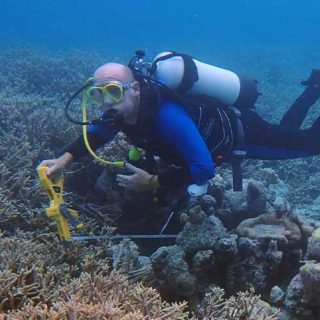
Jason Alexander
Jason is a PhD student under the supervision of Prof Euan Harvey and Dr Zoe Richards. Jason completed his undergraduate studies in Marine Science and Conservation Biology at Murdoch University in 2004. Jason then, between travelling, worked as a Zoologist for an environmental consultancy. Jason’s honours project involved the design of specific genetic primer sets and the detection of reef-building coral diversity from environmental DNA and in his PhD project he is extending those skills to examining the biodiversity of artificial reefs.
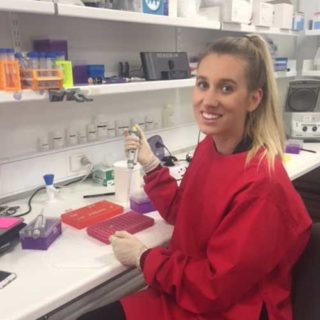
Georgia is an PhD student under the supervision of Prof Mike Bunce, Prof Euan Harvey and Dr Zoe Richards. Georgia completed her undergraduate studies at Curtin University in 2017. Georgia’s honours project involved developing environmental DNA assays capable of detecting cryptic and endangered Syngnathid species in various aquatic environments. Her PhD project seeks to examine ‘blue biodiversity’, that is the biodiversity in understudied deepwater and southern ocean pelagic ecosystems.

David completed his first class honours project under the supervision of Prof Mike Bunce and Dr Zoe Richards after finding an interest in scleractinian (hard-coral) taxonomy during his volunteering experiences at the West Australian Museum and Department of Parks and Wildlife. For his honours project, Davids undertook a phylogeographic study of the scleractinia Plesiastrea versipora, and he is extending that approach to the genus Porites in his PhD.
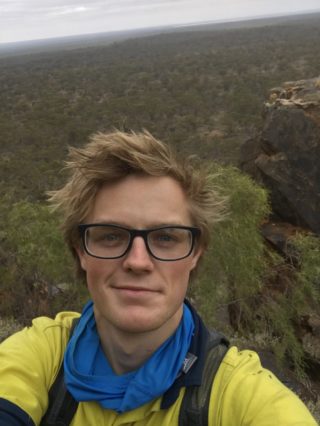
Josh Kestel
My area of interest is in pollination biology, specifically, the genetic consequences of different animal vectors for the plants they pollinate. I completed my Bachelor of Science majoring in botany and genetics at the University of Western Australia (UWA). Subsequently, I undertook my Honours research project with UWA and Kings Park Science examining bird pollination of the common catspaw (Anigozanthos humilis subsp. humilis). Now I have commenced my PhD using environmental DNA metabarcoding to examine plant-pollinator networks in avocado orchards in south west Western Australia.

Jacquelyn Jones
The link between the gut microbiome and human health continues to be of great interest, with a number of inflammatory, and autoimmune diseases as well as neurological disorders, linked to shifts in microbial community structure. Colonization of the infant gut by commensal microorganisms may be the most important processes for maintaining the long-term stability of the microbiome. Therefore, intervention strategies that promote a healthy infant microbiome may be beneficial in preventing the onset of inflammatory disorders which develop in infancy and early childhood. Through an assessment of faecal microorganisms and metabolites in pregnant mothers, infants, and young children, this project aims to reveal subtle changes in microbial composition and metabolic response which correlate with the progression of Autism Spectrum Disorder, or allergic diseases. This investigation will use next generation sequencing technology as well as gas chromatography, both of which have been invaluable tools for microbiome research. A final aim of this project is to evaluate and recommend fecal sampling techniques that can be adopted by researchers also intending to assess the gut microbiome using data generated with these same techniques.
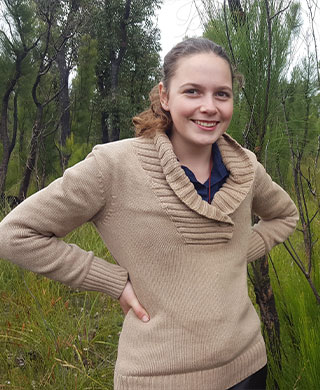
Kaylene Craig
Kaylene is a PhD candidate under the supervision of Dr Alison Blyth, Dr Paul Nevill, Dr Morten Allentoft, Prof Kingsley Dickson, Dr Lynne Milne. She completed her undergraduate double degree (BSc Applied Geology and Environmental Biology) (2017) and Honours (2018) at Curtin University. She studied the changing environmental conditions identified at Lake Chittering, north of Perth, WA, using elemental profiles and pollen for vegetation reconstructions from sediment cores. In 2019 Kaylene began her PhD thesis on the Paleoenvironment in the swamps of the southwest of Australia. Her project will use a large variety of independent proxies to test the hypothesis that although changing climate can cause stress on vegetation, it requires a destructive force, such as fire, to completely change the vegetation assemblage.
Master students
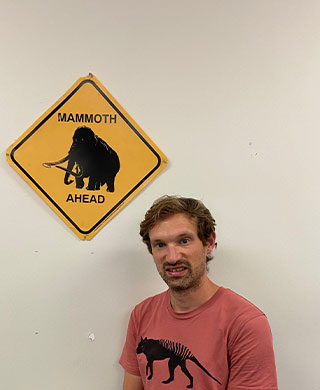
Matthew Power
Matt has been working in the Trend lab since 2014 as a Research Assistant, where he has been involved in wide range of research projects, most notably analysis of complementary and alternative medicines, dietary analysis and biodiversity surveys of terrestrial and marine species and analysis of past floral distributions using sedimentary ancient DNA. Before that he worked in both New Zealand and Sweden as a science technician.
Matt is currently a Masters student using sedimentary ancient DNA collected from Arctic sediment cores to investigate past faunal distributions.
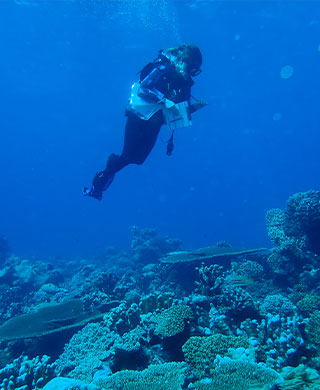
Sophie Preston
Sophie Preston is a Master of Research student, supervised by Dr. Zoe Richards and Dr. Kar-Chun Tan. Her project focusses on a combined traditional and molecular approach to diagnosing the scleractinian coral disease, growth anomalies. Her research is a combination of ecological surveys, histology, geochemistry, bacterial metabarcoding and environmental DNA. Prior to her Masters, she completed a Bachelor of Science (Coastal and Marine Science) at Curtin University in 2018.
Honours students
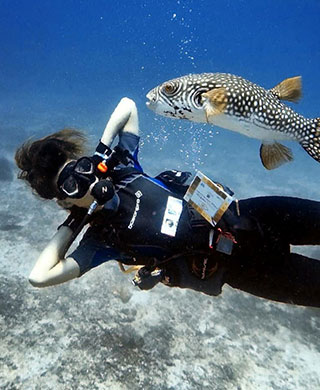
Amy Carmignani
Amy is an honours student under the supervision of Dr Zoe Richards. She completed her undergraduate BSc in Environmental Management & Sustainability and Marine & Wildlife Biology at Murdoch University in 2020 after a career change away from legal administration (or more accurately; after travelling and working overseas on conservation projects). She currently works for the Australian Wildlife Conservancy and is a committee member of the Murdoch University Divers Club. She has participated in a range of fieldwork relating to corals, seagrass, estuaries, marine ecology, plants, mammals and birds. Her Honours project is focused on examining the ecophysiology of mesophotic corals at Ashmore Reef. She will be undertaking a deep sea expedition on board the R/V Falkor and will collaborate with researchers at the WA Museum, Australian Institute of Marine Science and Museum of Tropical Queensland.
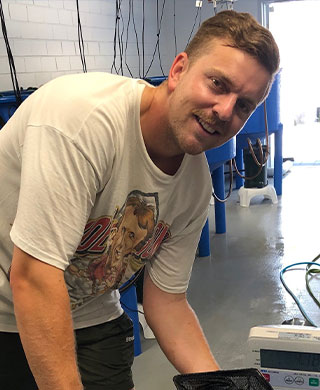
Joel Bennett
Joel is an honours student under the supervision of Dr Zoe Richards. He completed his undergraduate BSc in Coastal and Marine Science at Curtin University in 2020, after traveling North America and South East Asia for two years. He is interested in marine mammal and fish ecology, particularly along the Western Australian coastline. His Honours project is focused on utilizing eDNA approaches to advance knowledge about dugong populations, habitat use and diet. He collaborates with Associate Professor Kathryn McMahon at Edith Cowan University and Dr William Robbins from the Department of Biodiversity Conservation and Attractions.
Jamie Fox
Project title: Demonstration of the potential of environmental DNA as a tool for the detection of avian species
Josh Newton
Project title: Who is living in Perth’s trees: monitoring their role as homes for fauna with eDNA
Adjunct Staff, Collaborators and Visiting Fellows
- Adjunct Prof. Mike Bunce, NZ Environmental Protection Authority
- Assoc Prof. Claus Christophersen, Edith Cowan University
- Dr Sarah Crump, University of Colorado Boulder
- Prof. Simon Jarman, Curtin University
- Dr. Joey DiBattista, Curator of Fishes, Australian Museum
- Dr. Michael Stat, Newcastle University
- Shaun Wilkinson, Victoria University of Wellington, New Zealand
- Dr Jim Underwood, Research Scientist, Australian Institute of Marine Science
- Dr James Gilmour, Senior Research Scientist, Australian Institute of Marine Science
- Dr Luke Thomas, Postdoctoral Fellow, UWA Oceans Institute
- Dr Rodrigo Garcia, Adjunct Research Scientist Curtin University,
Research Scientist University of Massachusetts and Geosciences Australia - Assoc Prof Kathryn McMahon, Edith Cowan University
- Michelle Gaither, Assistant Professor, University of Central Florida
- James Reimer, Associate Professor, University of the Ryukyus, Japan
- Dr. Laura Gajdzik
- Mr Adam Koziol
- Dr. Tiffany Simpson
- Dr. Rose Lines
- Dr Giulia Perina, Western Australian Museum
Past students
- Morten Allentoft (PhD)
- Megan Coghlan (PhD)
- Alicia Grealy (PhD)
- Nicole White (PhD)
- Charlotte Oskam (PhD)
- Daithi Murray (PhD)
- Dalal Haouchar (Honours & PhD)
- Mieke van der Heyde (PhD)
- Silvana Tridico (PhD)
- Tina Berry (Honours & PhD)
- Brendan Chapman (Honours)
- Elizabeth Baker (Honours)
- Emma Ryan (Honours)
- Jeffery John (Honours)
- Helen Hunt (Honours)
- Matthew Heydenrych (Honours & Masters)
- Ethan Ryan (Honours)
- Emilija Lozenicins (Honours)
- Kristen Fernandes (Honours)
- Georgia Nester (Honours)
- Elizabeth Crompton (Masters)
- David Juszkiewicz (Honours)
- Jason Alexander (Honours)
- Miwa Takahashi (PhD)
- Katrina West (PhD)
- Frederik Valeur Seersholm (PhD)